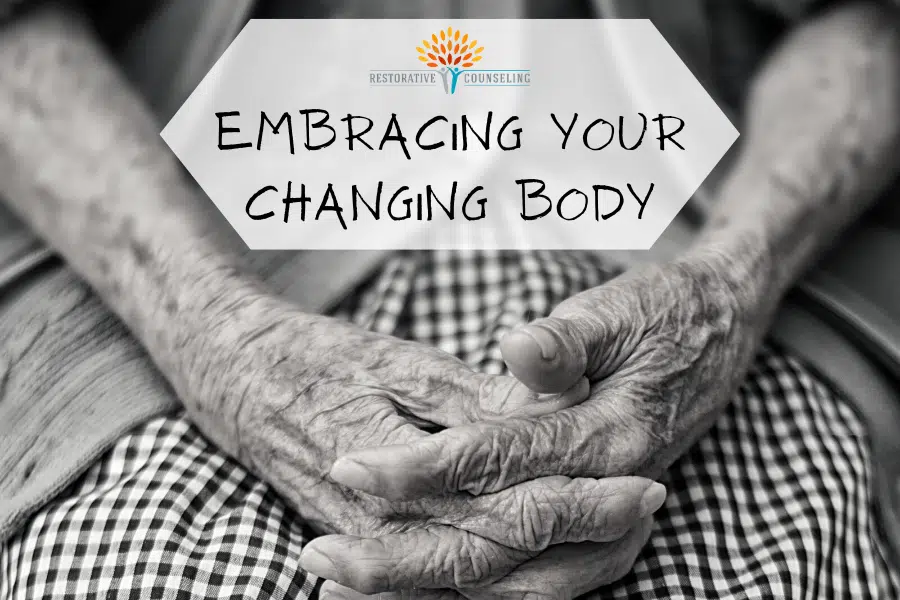Written by Katie Jackson-Griffin, LCPC
Change is hard. Noticing a change with your body can bring up a lot of complicated emotions. It’s natural to feel resistance or fear about what this could mean. Body size and ability can shape a person’s identity. One can feel defined by these characteristics: athletic, disabled, tall, short, fat, or small. When one of these characteristics changes, you might feel lost and unsure of how you fit in with others. However, change is a constant in life. Instead of resisting change, it is much more effective to work to embrace and accept your changing body.
Every person will have to adjust to body changes at some point in their life. Some of these changes may feel predictable, such as aging or pregnancy. Some will be a complete surprise, such as an injury or an illness. Despite what the change is, here are a few steps you can take to navigate your changing body with resiliency.
Learn to live in harmony with your changing body.
1. Explore your belief system around the change
Spend some time becoming aware of how you are thinking about this change. What labels are you using for the change? Are you placing judgment on yourself? Consider Robin as an example. As she enters into her second trimester of pregnancy, she starts to notice that her clothes are no longer fitting the same. Her body is getting larger, which she expected, but she didn’t expect to feel insecure about the change. She often thinks, “Will people know that I’m pregnant or assume that I’ve just gained weight?” and “Will they think I have let myself go?”
Robin’s fears are stemming from a common societal belief that being larger or gaining weight is morally bad. She is afraid that she will be judged by others. Robin is also uncomfortable with how her clothes fit and isn’t sure how to dress this new body. Her body is changing rapidly and she doesn’t fully feel like herself. By acknowledging that this line of thinking is influenced by society’s diet culture, she can create some distance from it. Robin can catch these thoughts, label them as ‘diet culture,’ and instead use neutral thoughts like, “It is okay to feel uncomfortable as I adjust to how my body is changing.” Ultimately, it doesn’t matter what other people think about her body. Robin’s body is allowed to change and her body is no one else’s business.
2. Practice mindfulness in observing your changing body
Mindfulness techniques can help you practice non-judgmental observation in order to further combat resistance and judgment about body changes. It’s common to want to avoid acknowledging the change fully as an attempt to avoid discomfort. This avoidance only serves to increase negative self-talk and negative beliefs that it’s not okay for bodies to change. Facing the changes head-on can help you embrace and radically accept your new body.
Look at your body in the mirror. Note the changes without placing any value on them. The changes are not good, bad, pretty, ugly, big, small, etc. They are just changes. You can use statements such as, “I notice my stomach here,” “I see the pimples on my chin,” “I see the wrinkles on my forehead,” or “I see the surgery scar on my knee.” The changes do not need to mean more than that they are simply present. Also, this exercise can help you integrate your new body into your sense of self. This can reduce some disorientation that can happen when your vision in your mind of your body is different than what you see reflected in pictures or a mirror. These changes are here and now part of you.
3. Ground yourself in the facts
Bodies are resilient and adaptable, thus body changes happen. Try focusing on the facts about why your body changes. It is okay to not like the change and you can recognize that your body is changing for a reason. Ultimately, the change is your body’s way of continuing to keep you alive or accomplish a goal for you. Helpful statements to repeat to yourself include, “My body is adjusting to new circumstances,” “My body is healing and needs to limit my abilities,” and “My body is reacting to a stimulus as best it can.” These facts can help you remember the purpose of the changes and highlight that your body is working hard for you.
It can be challenging to cope with your changing body, but these steps can help you embrace and love each new version of yourself.
If you still need support, Restorative Counseling can help!
The entire team at Restorative Counseling believes in your ability to embrace your new body. Our clinicians can support you in overcoming your struggles with body image. In order to get started, schedule an appointment with one of our clinicians today.

Hi, I’m Katie!
I use HAES and DBT approaches to help people overcome their challenges with low self-esteem, anxiety, and depression. Read more about me.
Follow Restorative Counseling
Sign up for our newsletter

